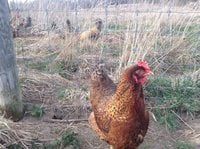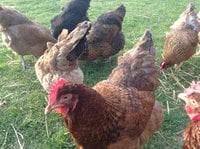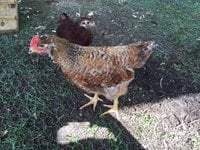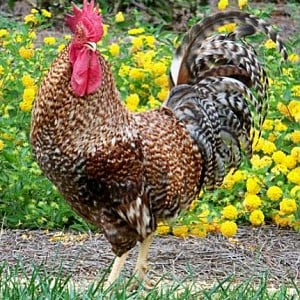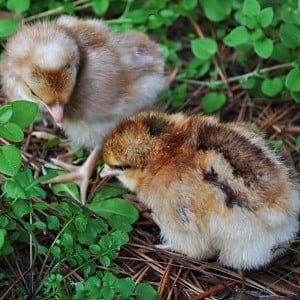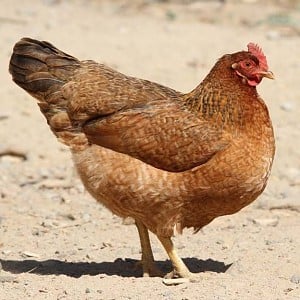We have only had these chooks for a month+, but they have already won me over. Daily layers of huge eggs, sweet dispositions, big, beautiful birds! And, even though ours were raised in breeding pens, they are awesome foragers. If they were as quiet as our Australorps, I think I'd have a new favorite.
Navigation
Install the app
How to install the app on iOS
Follow along with the video below to see how to install our site as a web app on your home screen.
Note: This feature may not be available in some browsers.
More options
You are using an out of date browser. It may not display this or other websites correctly.
You should upgrade or use an alternative browser.
You should upgrade or use an alternative browser.
Rhodebar
- Added by dheltzel
- Create date
- Updated
Rhodebars are Rhode Island Reds that are strongly autosexing because the barring gene has been...
- BlackwoodHollow
- 5.00 star(s)
Pros: Amazing layers of extra large to jumbo sized eggs; rooster is very caring and attentive; great foragers
Cons: A little on the loud side.
- HJSmith
- 3.00 star(s)
Pros: Neat coloring, Get along with most other breeds well
Cons: 1 rooster very mean
When I first got my chicks I was told 2 of the 12, were Orpingtons, as they got bigger and grew different colored feathers, we found out they were actually 2 Rhodebars, Blanche & Biggie. Biggie grew faster than all the other chickens, and started growing a comb quickly as well, so we figured she was actually a he. However, Blanche did not grow very fast so we assumed she was still a she, and she was mine and my 3 year old daughter's favorite. Blanche was the first to come running for treats, would follow us around, even the only one who didnt have much problem with me picking her up. Biggie was very docile, but skittish. As they got older, Biggie began crowing at 8 weeks, and was starting to act like a rooster, always circled around the girls when they free ranged, let them get treats first, if he heard something he would try to get them back to the run. Blanche continued to act like one of the girls. Then Blanche started growing a comb and wattles and began to crow at 12 weeks. It was almost like a switch had been flipped, as soon as she realized she was actually a he, he became mean. He pecked at me constantly, not too big of deal since I was usually wearring pants when he pecked my legs, but one day he pecked my daughters leg and drew blood. Then he kept attacking Biggie, and started jumping on, and pecking at the other girls to get to the treats. So we had to get rid of him. I find it odd how different the 2 boys turned out, being the same breed from the same hatch.
In summary, both boys from same hatch:
Biggie - docile, skittish, but looked out for his girls
Blanche - became mean to chickens and humans, not very good rooster
In summary, both boys from same hatch:
Biggie - docile, skittish, but looked out for his girls
Blanche - became mean to chickens and humans, not very good rooster
- Rhodebar Lover
- 5.00 star(s)
Pros: Great layers, amazing temperament, and beautiful!
Cons: WAY less common than they should be and in cold climates can get frostbite.
Rhodebars are the perfect breed for almost anyone! I have raised Silkies, Australorps, Easter Eggers, Marans, Brahmas, English Orpingtons, Cream Legbars, Plymouth Rocks, Rhode Island Reds, and Polish and none of them even compare to Rhodebars. They are my best layers of brown eggs and although I have never personally butchered them, could be used for meat production. My roosters have never been aggressive and will tolerate little kids invading their turf. The hens LOVE to sit on your lap and be petted. To get your attention they will bite your legs playfully and will run all the way up a large hill to our house which is far away from the coop. They are even beautiful, the hens have mixes of different shades of brown with eye catching patterns and the roosters look like more colorful versions of Barred Plymouth Rocks. To top it off they are auto-sexing so the female chicks will look like chipmunks and the male chicks are a lighter color and have an obvious white spot on their head! The only downsides are that in the winter the roosters will get frostbite and they are hard to find breeders that sell them. To sum it up they are perfect for about any purpose!
- SerenityAcreslw
- 5.00 star(s)
Pros: Calm, Beautiful and excellent layers!
I only have two Rhodebars, Hildred and Mildred. They are both beautiful, calm and are great layers with pretty brown eggs. They get along great with my Orpingtons. Truly a lovely breed!
- dheltzel
- 5.00 star(s)
Pros: Great layer, calm disposition, chicks easily sexable at hatch
Cons: Hard to find, no commercial hatcheries carry them yet
Take a Rhode Island Red, add barring and take away a few other genes, and you have an auto-sexing brown egg layer. The commercial world is dominated by sex-link hybrids, but as everyone knows (or soon finds out), the magic of color sexing chicks does not continue into future generations. Hatcheries might like this because it keeps customers from raising their own replacement stock, but backyard breeders who would like to hatch their own, would be much better served by keeping auto-sexing breeds.
Our hens are top notch layers, yesterday I collected 10 eggs from 11 hens, and one of those is the original hen and is likely still completing her molt. They are calm but curious, always first in line for anything that looks like a treat.
Roosters are pretty and never people aggressive. They get large too (like a RIR) and would no doubt make a reasonable meat bird.
Our hens are top notch layers, yesterday I collected 10 eggs from 11 hens, and one of those is the original hen and is likely still completing her molt. They are calm but curious, always first in line for anything that looks like a treat.
Roosters are pretty and never people aggressive. They get large too (like a RIR) and would no doubt make a reasonable meat bird.

